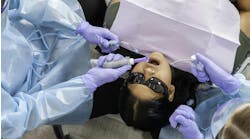by Mark Murphy, DDS
For more on this topic, go to www.dentaleconomics.com and search using the following key words: dental insurance, insurance reimbursement, access to care.
The TV show "MythBusters" typically tests a popular myth that has become urban legend or folklore. Sometimes they bust the myth, and other times they prove it true. They design experiments, manufacture props, and use all kinds of scientific applications to simulate the reality needed to confirm or deny the myth.
I want to be perfectly clear before taking on the dental insurance goose that laid a golden egg. I am not opposed to dental insurance as a concept or as it is applied. However, I will challenge its limitations, language, and the dependence upon it that compromises our ability to do our best. Access to care is of the utmost importance in our world today, and we should do all that we can to improve it. I am just not convinced that what we have is working as well as it could.
"Dental insurance ... it's not really insurance at all." Insurance is defined as a third party taking the risk of a catastrophic loss. My wallet does not have $1,200 in it, and that is the annual limit of most dental insurance reimbursement. While we can agree that there is nothing "catastrophic" about $1,200, CareCredit and other third-party financing companies could help us with those out-of-pocket costs. It is a lot of money, to be sure, but it lacks the catastrophe that insurance was designed to protect us against. If you lost your home to fire, totaled your car, or had major medical surgery that required hospitalization, that would be catastrophic.
"If other insurances worked like this, we would revolt." If you totaled your new car and the insurance adjuster offered a $1,200 to $1,500 total settlement, you would call the state insurance agency, the Better Business Bureau, and your lawyer to complain. We have expectations of coverage for catastrophic losses that would be severely unmet. However, that is exactly how most dental insurance works.
"Call it what it really is … a maintenance plan." If your car insurance only covered oil changes twice a year, annual tire rotation and wiper blades, and a tune-up every three years, it would be useful to have, but it is not insurance. Dental insurance helps us keep our mouths in good health, but if something bad should happen that required an expensive fix, we are out of luck.
"If dental insurance kept up with inflation, it would cover $7,500." Depending on whether you start with $1,200 or $1,500 and use 3% to 5% inflation rates, dental insurance should cover $5,000 to $9,000 by now. Can you imagine answering a patient's often-asked question, "Will my insurance cover that?" with, "It will cover the first $7,500 ... and then we can use another $7,500 next year"? Wow, that would improve treatment plan acceptance.
"Our reliance on this entitlement has compromised recommending necessary care for patients." Not everyone or every time, but more often than not, dental insurance clouds the treatment planning process and makes it more difficult for us to do our best for our patients. The easiest way to achieve the coveted million-dollar practice is to treatment plan one crown and two cleanings a year on 1,000 patients. It does not require developing strong health-care advocacy relationships or comprehensive examination and treatment planning. You don't even need good communication skills or education. You simply have to point at a broken-down tooth and answer "Yes" to the "Does my insurance cover this?" question. It is an easy sell.
On the other hand, not many of us set out on this journey with the vision that we could do "one tooth at a time" or "insurance dependent" dentistry and find real meaning and fulfillment. We want to do and be our best. Choosing comprehensive care takes time and commitment.
At Pankey, I learned the people and financial skills that could support developing the practice style that would allow me to do my best stuff for and with people I like. But the siren's song of dental insurance sounds oh so sweet and smooth. That road travels easier than the rest. It is the path of least resistance. When we invented this reimbursement method and left it unchanged for 40 years, we chose the least resistant path. Maybe it is time for some of us to take the path less traveled. It may make all the difference for us and for our patients.
Freedom of choice is our greatest individual power.
I shall be telling this with a sigh
Somewhere ages and ages hence:
Two roads diverged in a wood, and I –
I took the one less traveled by,
And that has made all the difference.
— Robert Frost
Mark Murphy is a featured presenter for the National Dental Network and the National Lab Network. He lectures internationally on a variety of dental clinical and behavioral subjects. Dr. Murphy practices part time in Rochester Hills, Mich. You may contact him by e-mail at [email protected] or visit mtmurphydds.com.





